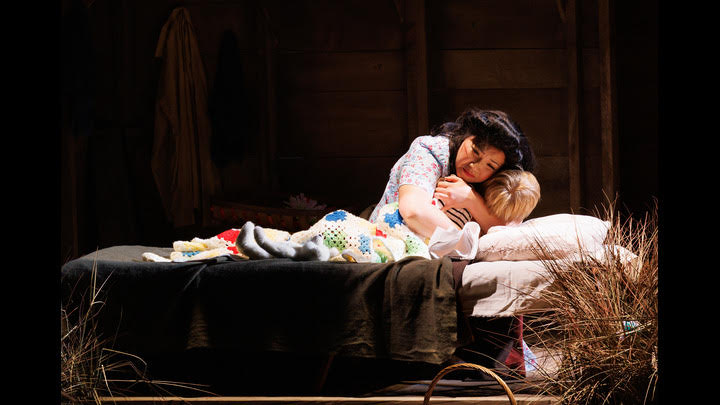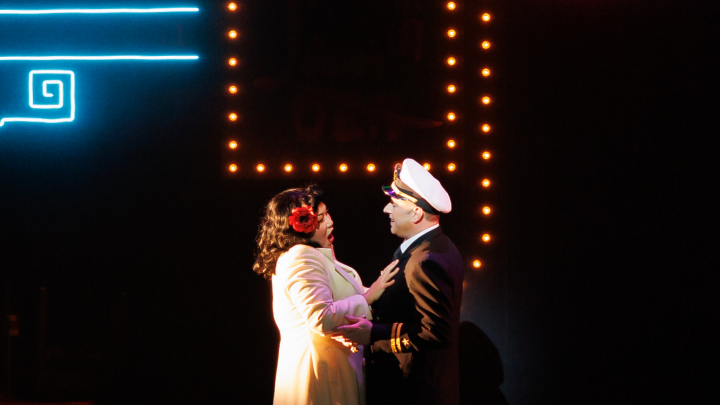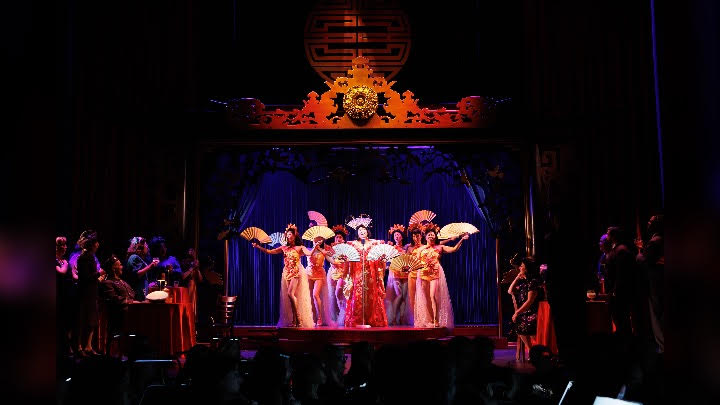

His view towards Puccini’s Madama Butterfly, as the new production at Boston Lyric Opera which opened last weekend and runs through Sunday attests, is evidently a capacious one; in both tweaking the libretto and transposing the action from an orientalized turn-of-the-century Japan to the years straddling Executive Order 9066 (which forced over 125,000 Japanese Americans into concentration camps during World War II), he seeks to maintain fidelity first and foremost to the gaps in time between the events that defined our conceptions of Japan and the contemporary moment.
In doing so, Butterfly becomes a singer in a nightclub and Act II finds her confined to a camp in Arizona awaiting Pinkerton’s return to rescue her and her sick child.
There are aspects of Chan’s reimagining – conceived in partnership with BLO artistic advisor and dramaturg Nina Yoshida Nelsen—that really do feel like improvements to the original; with the delightful Karen Chia-Ling Ho in the title role, Butterfly is refreshingly strong, assured, even spunky. Many of Pinkerton’s predatory lines in the Act I duet have been reassigned to her to a pleasant neutralizing effect, and few might miss infantilizing pet names like “piccina mogliettina” (though something that scans better than “eterna dolcezza” would be preferred).
In fact, the love duet, which has a slow-burn quality as Butterfly and Pinkerton (Dominick Chenes) close up the night club at which Butterfly works, is the highlight of the production. At the end, they freeze in tableau recreating Alfred Eisenstaedt’s iconic “The Kissing Sailor,” a photo whose violent backstory of a drunk sailor forcibly kissing a “nurse” in celebration of the Japanese surrender nods to the opera’s implicit threads of both cultural and interpersonal imperialism and domination.
Yet ultimately, a production that started with the question “what else could this be?” seems in many respects to have not completely addressed the preliminary question, “what is this to begin with?” The result is a production that is highly watchable and easily listenable, but, despite numerous poignant touches, not especially legible.
The legibility question applies both in the macro and the micro; often, the subtitles, by Natalia St Jean, actually say (in a punchy mid-century American glossing) something opposite or otherwise unrelated to what the characters are saying. Yet on a broader level, the overhauled synopsis in the program describes a story sufficiently different from the original that neither the moderately retouched libretto nor Chan’s deft choreographic hand can fully convey without the help of a narrative explanation.
More changes to the text – ideally made with the consultation of an Italianist for phonetic reasons, though, again, I’m biased – would have been welcome had they served to give the new story greater coherence.
The concept seems stranded between the contradictory goals of making Butterfly more of a three-dimensional historical protagonist and less of a fetishized object while simultaneously erasing the traces of individual biography – including anything about her religion or much about her family – with which Illica and Giacosa’s libretto furnished her.
The original opera’s archetypes, which engage with each other in extremely specific ways as either symbols or characters, have been substituted with more anonymous avatars endeavoring to telegraph emotions alternately universal and specific to the new setting that the peaks and valleys of the music can only intermittently support. Puccini’s robust palette of tonal and rhythmic leitmotivs (like the dagger motif or the anticlimactic reveal of the child to Sharpless) often just fizzle out, divorced from the words that engaged them.

While Keiko Orrall is a warm presence from the get-go as a retirement-aged Butterfly haunting the stage, her sad recollecting can only do so much to give the new version as it is conceived a sense of stakes. When the moving slideshow of images of concentration camp residents began during the Act III prelude, the pained question about opera’s entrenched status as a “museum art form”—a conviction Chan’s writing about ballet has repeatedly railed against — felt especially pressing.
Reservations about the narrative interventions aside, Chan’s first swing at an opera shows a lot of promise; the singers move with an uncommon fluidity and comfort across Yu Shibagaki’s detailed sets and individual characterizations abound both from the leads and from the ensemble (Act I features an almost non-stop flurry of background activity).
With more fine-tuning to its libretto (and an overhaul of its misleading surtitles), this Butterfly could truly stand as a landmark example of a modernization rigorously academic and dramatically engrossing in equal measure. Chan and his creative team have gone far in recontextualizing this work, and I hope in the future they will go ever further.
Musically, the performance delivered more consistently – the exceedingly appealing Chia-Ling Ho is in full command of a colorful, easily dispatched lyric soprano as Butterfly and her high notes, testimony to her particularly fine sense of registration, resonate with real freedom. Yet it’s her singing combined with a sense of composure, of a sovereign stillness rather than fanaticism or anxiety, that gives her performance a particularly moving dignity.
Chenes is an able, if rather generic, counter; a softened, more palatable Pinkerton, his tenor spins out into the house with minimal effort but often turns bleaty. More satisfying on the tenor front was Rodell Rosel as an uncommonly rich-voiced and charismatic Goro, here the owner of the nightclub Butterfly performs at.
Alice Chung exudes both vocal and physical presence as Suzuki, a waitress at the nightclub, while Troy Cook, positively swimming in his military uniform (costumes are by Sarah Ryung Clement), was disadvantaged as Sharpless by a ductile voice that nevertheless seldom had time to grow into its full resonance across Puccini’s short, conversational phrases.
David Angus ran a tight ship from the pit; the playing from the BLO Orchestra was remarkably cohesive and his take on the score reflected the title character’s sense of composure – in “Un bel di,” he held his punches right until the end, the strings simmering until they suddenly reached an exciting full boil along with Chia-Ling Ho at the final “aspetto!”
Yet that final exclamation is a descriptive one in this production, rather than a resolute or declarative one. And I am also waiting, optimistically, for Chan’s future opera work to further develop the character of its dialogue between history, documentary, music, and words.
Photos: Ken Yotsukura


























Comments